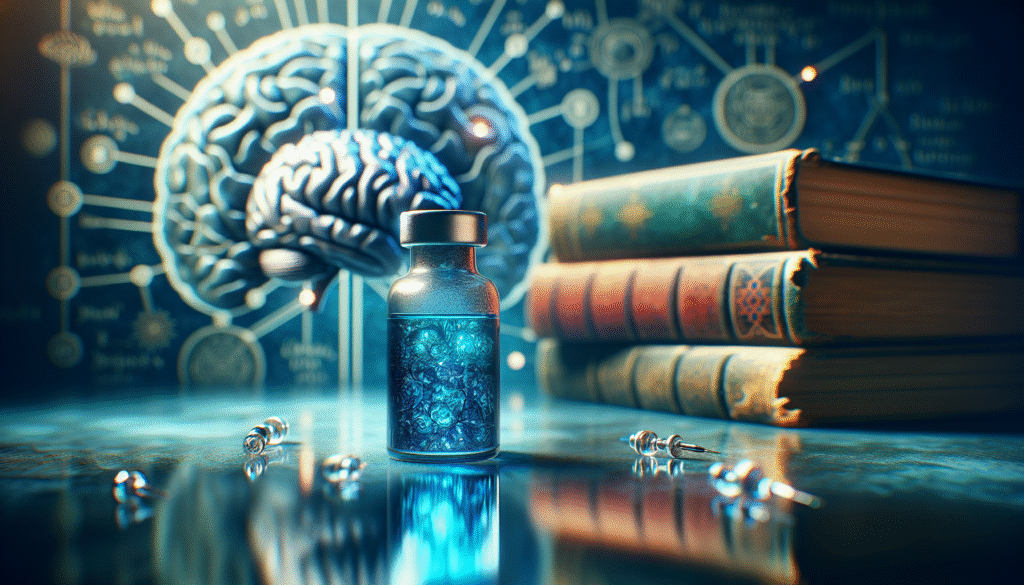
Have you ever encountered a problem so complex that it seemed insurmountable? As you navigate through life’s challenges, you may have pondered whether a particular substance could aid in sharpening your cognitive abilities, especially in the realm of problem-solving. One such substance gaining attention in various circles is Methylene Blue.
In this article, we will examine the intriguing claims surrounding Methylene Blue and its potential effects on cognitive functions, particularly in problem-solving. Understanding its mechanisms, benefits, and limitations is crucial before considering its application in your cognitive arsenal.

Understanding Methylene Blue
Methylene Blue is a synthetic compound that has been utilized for over a century in various medical and industrial applications. Originally developed as a dye, it later found its place in science and medicine due to its unique properties.
Historical Context
Methylene Blue was first synthesized in 1876 by Heinrich Caro and was used as a textile dye before its medicinal properties were recognized. In the medical field, it has been employed as an antiseptic and has played a critical role in the treatment of methemoglobinemia, a condition where hemoglobin is unable to effectively release oxygen to body tissues.
Mechanisms of Action
Methylene Blue acts primarily as an electron donor in cellular respiration. By facilitating the transfer of electrons in the mitochondria, it can enhance the production of ATP, the energy currency of the cell. Increased ATP levels can potentially enhance overall brain function, which raises the question of whether it can influence problem-solving abilities.
The Cognitive Functions of Methylene Blue
To understand how Methylene Blue may impact your problem-solving skills, it is essential to delve into its effects on cognitive functions.
Neuroprotective Properties
Studies have indicated that Methylene Blue possesses neuroprotective properties. It may reduce oxidative stress and inflammation in the brain, two factors that can impair cognitive performance. By protecting your neural pathways, Methylene Blue creates a more favorable environment for enhanced cognitive functions.
Enhancing Memory and Learning
Several animal studies have suggested that Methylene Blue may improve memory and learning capabilities. For example, research has shown that low doses can enhance memory retention and learning speed in rodents. While translating these findings directly to humans is complex, they pose intriguing possibilities for your cognitive enhancement.
Mood and Motivation
Your mood plays a pivotal role in problem-solving. Methylene Blue has been noted for its potential antidepressant effects, which may contribute to improved motivation and cognitive flexibility. When you feel emotionally balanced, your cognitive processes may work more cohesively, enhancing your ability to tackle problems.
The Evidence Surrounding Methylene Blue and Problem-Solving
While the theoretical frameworks suggest a potential link between Methylene Blue and improved cognitive function, it is essential to scrutinize the available evidence.
Clinical Studies
The clinical landscape surrounding Methylene Blue is not as abundant or conclusive as one might hope. Some studies have shown promising results in small populations, but larger, more comprehensive clinical trials are needed to draw definitive conclusions.
Limitations of Current Research
Most research has been conducted on animal models or small human groups, often without a placebo control. As with any substance, effects can vary widely among individuals, and findings from one study may not hold true across all populations.
The Placebo Effect
The mind’s capacity for self-improvement through belief cannot be underestimated. Even if Methylene Blue has some efficacy in enhancing cognitive functions, a substantial portion of its effects may stem from the participant’s belief in its benefits—an essential consideration when interpreting the existing research.
Considering the Risks
Any consideration of using Methylene Blue as a cognitive enhancer must take potential risks into account.
Dosage and Toxicity
Determining an effective dose is challenging, as the balance between benefits and risks can be delicate. While low doses may offer neuroprotective benefits, higher doses can lead to adverse effects, including serotonin syndrome when combined with certain medications.
Potential Side Effects
You should be aware of possible side effects, including:
- Discoloration of urine and stool: A harmless effect, but it can be alarming.
- Nausea and gastrointestinal distress: Common with various medications and can impact your comfort.
- Headaches: This can be uncomfortable and may hinder cognitive performance.
- Insomnia: With high doses, difficulty sleeping may also arise.

Practical Implications of Methylene Blue for Problem Solving
If you are contemplating utilizing Methylene Blue to enhance your problem-solving skills, several factors warrant careful consideration.
Method of Administration
Methylene Blue can be administered in various forms, including tablets, injections, and topical applications. The method you choose plays a vital role in implementation and effectiveness. For cognitive enhancement, oral administration is common, though the bioavailability and absorption rates can vary.
Integration Into a Broader Cognitive Enhancement Strategy
Relying solely on Methylene Blue as a panacea for cognitive enhancement is unwise. A multifaceted approach incorporating diet, exercise, mental exercises, and good sleep hygiene alongside any supplements will generally lead to more sustainable improvements in cognitive function.
Consultation with a Healthcare Professional
Before incorporating any new supplement or drug into your regimen, consulting with a healthcare professional is essential. They can provide tailored advice based on your health history, current medications, and individual needs.
Your health and cognitive well-being should always be prioritized.
Alternative Strategies for Enhancing Problem-Solving Skills
While Methylene Blue presents an intriguing possibility, other, more established methods can also enhance your problem-solving skills.
Mindfulness and Meditation
Mindfulness and meditation practices have gained widespread recognition for their ability to improve focus, clarity, and problem-solving capabilities. These practices can help reduce stress and enhance cognitive flexibility, thus allowing for better assessment and resolution of problems.
Physical Exercise
Research shows a strong correlation between regular physical activity and improved cognitive functions, including memory, attention, and problem-solving skills. Exercise increases blood flow to the brain and promotes the release of neurotransmitters that can enhance brain function.
Mental Challenges
Engaging in puzzles, strategy games, and learning new skills can significantly enhance your problem-solving capabilities. By continually challenging your mind, you trains your brain to think critically and creatively, which is essential for effective problem-solving.
Social Engagement
Collaborating with others to tackle complex problems is often more effective than solitary efforts. Engaging with diverse perspectives can lead to more innovative solutions, as different viewpoints can illuminate aspects you may have overlooked.

The Future of Cognitive Enhancers
The landscape of cognitive enhancers, including Methylene Blue, is rapidly evolving. New research continually sheds light on their potential and limitations.
Continuous Research
As various studies continue to unfold, the understanding of how Methylene Blue and similar substances affect cognitive functions will deepen. Emerging revelations may either bolster the arguments for its use or highlight considerations that make it less appealing.
Personalized Approaches
In the future, personalized medicine may play a significant role in the efficacy of cognitive enhancers. Genetic factors, lifestyle choices, and individual brain chemistry could all influence the effectiveness and safety of substances like Methylene Blue, paving the way for more tailored solutions.
Conclusion
The prospect of using Methylene Blue to enhance your problem-solving skills is compelling yet enveloped in uncertainty. While preliminary studies provide a base of interest, much of the larger narrative is still being written. The neuroprotective properties and potential cognitive enhancements propose that Methylene Blue may be advantageous, but the existing body of evidence leaves room for caution.
You are encouraged to approach this subject with a balanced understanding. Incorporating holistic strategies for cognitive enhancement alongside any new considerations will better equip you to face complex challenges. Ultimately, enhancing your problem-solving skills is a multifaceted endeavor that requires patience, dedication, and a willingness to explore various avenues.
